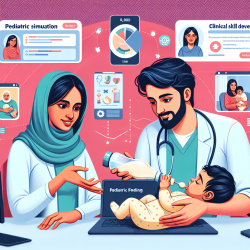In the ever-evolving field of healthcare, staying informed and adapting to new research findings is crucial for practitioners. A recent study titled "Using protection motivation theory to explain the intention to initiate human papillomavirus vaccination among men who have sex with men in China" offers valuable insights that can be applied to improve health education and vaccination strategies. This blog post delves into the key findings of this research and how they can be leveraged by practitioners to enhance their practice.
Understanding the Research Context
The study focuses on the intention to initiate HPV vaccination among men who have sex with men (MSM) in China, a group with a significantly higher prevalence of HPV infections compared to heterosexual males. Despite the efficacy of HPV vaccines in preventing related diseases, MSM in China are not currently included in the national vaccination plan. The research utilized Protection Motivation Theory (PMT) to assess factors influencing vaccination intentions among this population.
Key Findings and Their Implications
The study revealed several critical insights:
- Low Knowledge Levels: Participants exhibited limited knowledge about HPV and its vaccine, highlighting a need for targeted educational interventions.
- Moderate Intention to Vaccinate: Only 43.3% expressed an intention to initiate vaccination within six months, indicating barriers that need addressing.
- Influence of PMT Variables: Factors such as perceived severity, vulnerability, response efficacy, and self-efficacy significantly impacted vaccination intentions.
- Barriers Identified: High costs and lack of awareness about where to get vaccinated were major obstacles.
Implementing Research Outcomes in Practice
Practitioners can apply these findings in various ways:
- Enhance Education Programs: Develop comprehensive educational materials focusing on the risks of HPV and the benefits of vaccination. Tailor these programs to address specific misconceptions identified in the study.
- Advocate for Policy Changes: Use this research as evidence to advocate for the inclusion of MSM in national vaccination programs and for government subsidies to reduce financial barriers.
- Cultivate a Supportive Environment: Encourage healthcare providers to proactively recommend HPV vaccinations during consultations with MSM patients.
- Pursue Further Research: Engage in or support further studies that explore effective intervention strategies based on PMT to increase vaccination uptake.
The Role of Online Therapy Services
Online therapy platforms like TinyEYE can play a pivotal role in disseminating information and supporting educational initiatives. By leveraging digital tools, practitioners can reach wider audiences and provide accessible resources tailored to specific populations such as MSM. This approach not only enhances knowledge but also empowers individuals to make informed health decisions.
The integration of technology into healthcare education can bridge gaps identified in traditional settings, offering personalized support while overcoming geographical and logistical barriers.
Conclusion
The insights gained from this research underscore the importance of targeted education and policy advocacy in improving health outcomes among marginalized groups. Practitioners are encouraged to incorporate these findings into their practice, fostering an environment that supports informed decision-making and equitable access to healthcare services.










